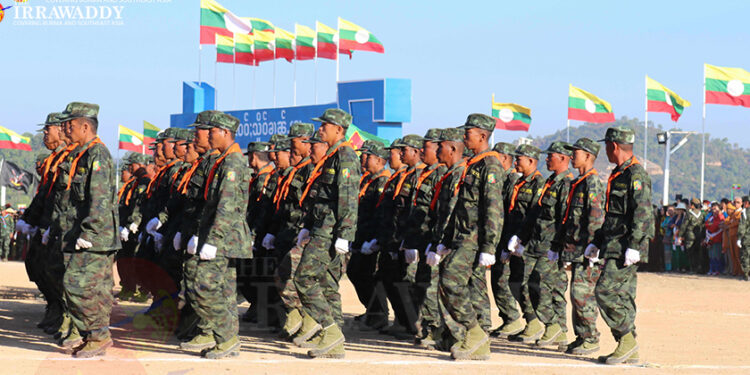LOI TAI LENG, Shan State—General Yawd Serk appeared upbeat and enthusiastic as he sat down with us at his home in Loi Tai Leng in the hills of Shan State on Myanmar’s border with northern Thailand, and home to the headquarters of the Restoration Council of Shan State/Shan State Army-South (RCSS/SSA-S).
The general was still in a buoyant mood following his visit last month to Naypyitaw, where he held extensive talks with government leaders and Senior General Min Aung Hlaing, the commander-in-chief of the armed forces. He was clearly pleased with the outcome of the meetings and seemed gratified by the reception he received in the nation’s capital.
“We had never had such a one-on-one meeting with the army chief before. During our talk, we discussed misunderstandings and misinterpretations. Actually, our views on the changes [needed] for the betterment of the nation are not so different. The army chief makes changes in his way, and there are only small differences between us, because our views and our desires are similar,” the bespectacled Shan leader said with a broad smile.
The mood was in stark contrast to late October, when Gen. Yawd Serk’s planned trip to Naypyitaw had to be aborted at the last minute after the chief of the army’s Eastern Central Command refused him permission to travel by road to attend a ceremonial peace conference in Naypyitaw, insisting that he fly instead.
Since then, in an effort to mend fences, the Myanmar military (or Tatmadaw) has sent a number of high-ranking officers to meet with Shan leaders in Chiang Mai, northern Thailand.
The outcome so far has been positive.
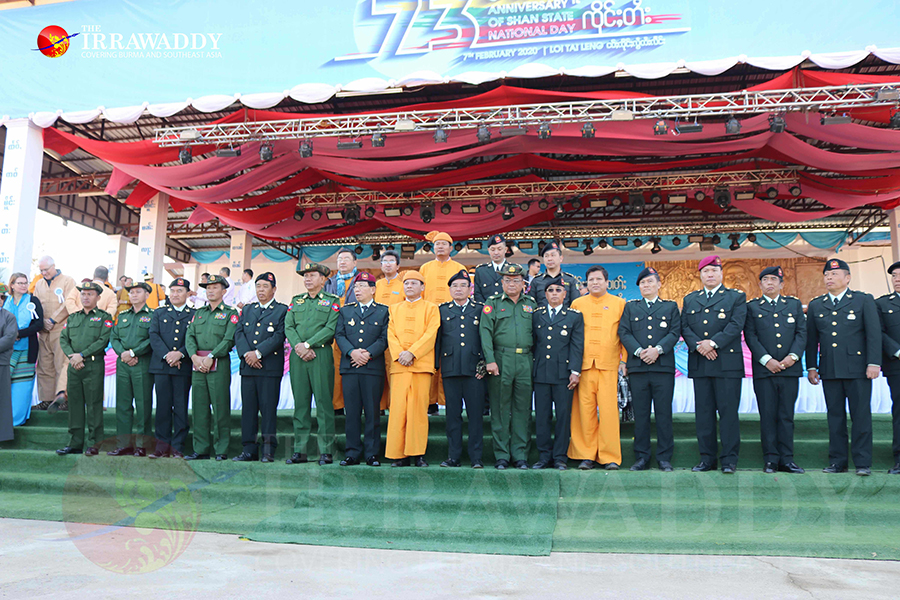
At their meeting in early January, which was by all accounts highly productive, Gen. Yawd Serk and Sen-Gen Min Aung Hlaing sat down for more than three hours and spoke through a translator. His meetings with government leaders including State Counselor Daw Aung San Suu Kyi also served to advance mutual understanding, the Shan leader said. Notably, Shan leaders did not talk much about their meeting with Daw Aung San Suu Kyi, and seemed more eager to talk about the positive outcomes of their meeting with Snr-Gen Min Aung Hlaing.
The interpreter was required as Gen. Yawd Serk speaks limited Burmese. However, observers who have known him for a long time say these days the general has developed a habit of slipping into Burmese occasionally when he wants to emphasize a point across the table. Indeed he did so several times during our interview.
At their meeting, Sen-Gen Min Aung Hlaing seems to have launched a charm offensive, saying he believes in and accepts the idea of a federal union. He also surprised his Shan guests by acknowledging a need to amend the Constitution but insisting that this must be done gradually (the army’s appointees in Parliament continue to oppose the ruling party’s proposed constitutional changes), and requesting that Gen. Yawd Serk help to achieve peace by bringing those ethnic armed groups that have yet to sign the Nationwide Ceasefire Agreement into the process.
The Shan leader said he was surprised at the senior general’s words.
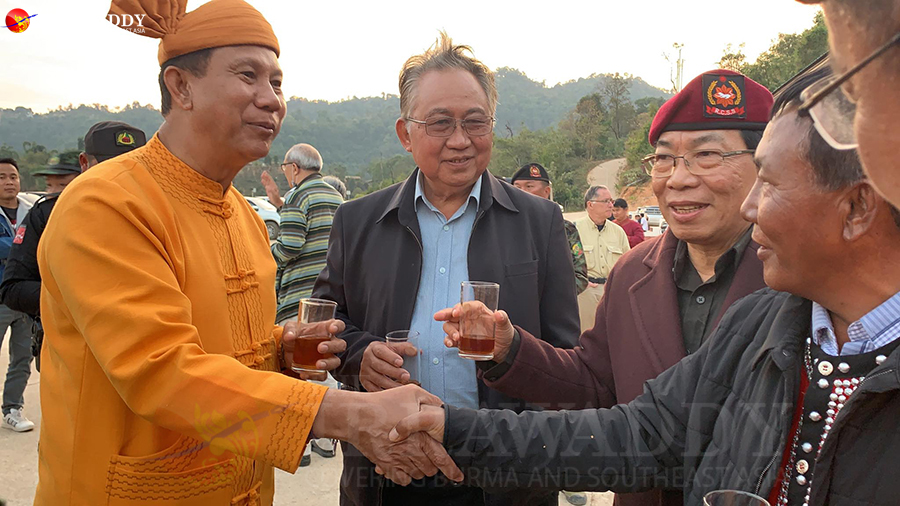
“We had not had this kind of discussion before. Listening to him I was quite amazed; it gave me a better understanding of his goals and policies. The army chief speaks in one way [harshly] in his addresses, but during our conversation, he spoke in another way. So I now have two ways to see things: the way he spoke during our meeting, and the way [I see] his speeches. We will wait and see [his actions],” he told us during a recent interview on a chilly day in Loi Tai Leng.
Since the Naypyitaw meetings, Myanmar leaders have tried to keep up the momentum and continue making positive overtures.
When the RCSS celebrated Shan State National Day in Loi Tai Leng in early February, both the Myanmar government and military honored Gen. Yawd Serk’s invitations by dispatching top-level officials to attend the commemorations.
Union Attorney-General U Tun Tun Oo and Defense Services Inspector Lieutenant General Aye Win were among the 11-member delegation that made the trip to RCSS headquarters.
Significantly, it was the first time that officials from the highest levels in Naypyitaw had set foot in the Shan armed group’s headquarters. Smiles and firm handshakes were exchanged, and rounds of whiskey tossed back. The promise of peace was held out—at least for that evening; to be sure, there was no shooting.
At a dinner on the eve of the main ceremony, Gen. Yawd Serk played the role of diplomat, creating an inclusive atmosphere in which all groups could come together and feel welcomed.
As host, he invited ethnic leaders, including those from groups that have yet to sign the NCA, to come to the main stage and sing songs and dance. The government delegation and army generals and other officers joined in somewhat awkwardly—but at least they were smiling.
It was an important opportunity to let off steam.
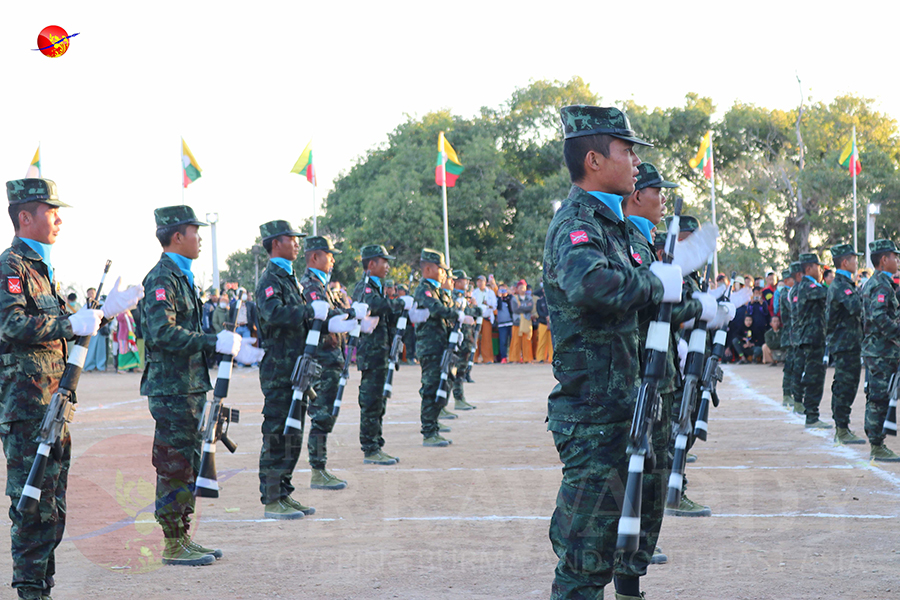
“Drinking is better than shooting,” a Shan colonel said, as more whiskeys arrived and peace seemed, at least for the moment, to be a little closer.
“But it is better we don’t talk,” a Shan commander renowned for his frontline fighting skills said with a grin. “Once we start to talk, we start to argue and fight again.” His evaluation seemed fair enough to me, so we ordered more drinks.
A foreign peace consultant walked passed and smiled at us. He couldn’t have known what the Shan commander had told me, but just the sight of the party seemed to be enough to create a sense of hope—even if it was a false one, a bit of theater.
Many ethnic leaders recalled fondly the peace meetings held under former president U Thein Sein, events characterized by free-flowing whiskey and other spirits, as well as teasing and laughter. Held at hotels in Naypyitaw or Yangon, or at the insurgent groups’ headquarters, these events served to relieve the tension on all sides, they said. (Whenever such meetings are held, expensive whiskey plays an important role—and donors are happy to foot the bill, according to the ethnic leaders.)
They said they missed U Aung Min, who previously served as President’s Office minister and, more importantly, chairperson of the Myanmar Peace Center. Considered the chief peace negotiator, he got along well with several ethnic leaders who also enjoyed late-night drinking sessions. Many of these leaders have a reputation for being “rat holes”—meaning they can quaff great quantities of alcohol.
But this culture has disappeared under the current government. The fighting on the ground has intensified, lives have been lost and peace seems distant. Peace talks are characterized by stony faces, reserved language, stiffness and stress. The government also appointed Daw Aung San Suu Kyi’s personal physician to a key post at the National Reconciliation and Peace Center (NRPC).
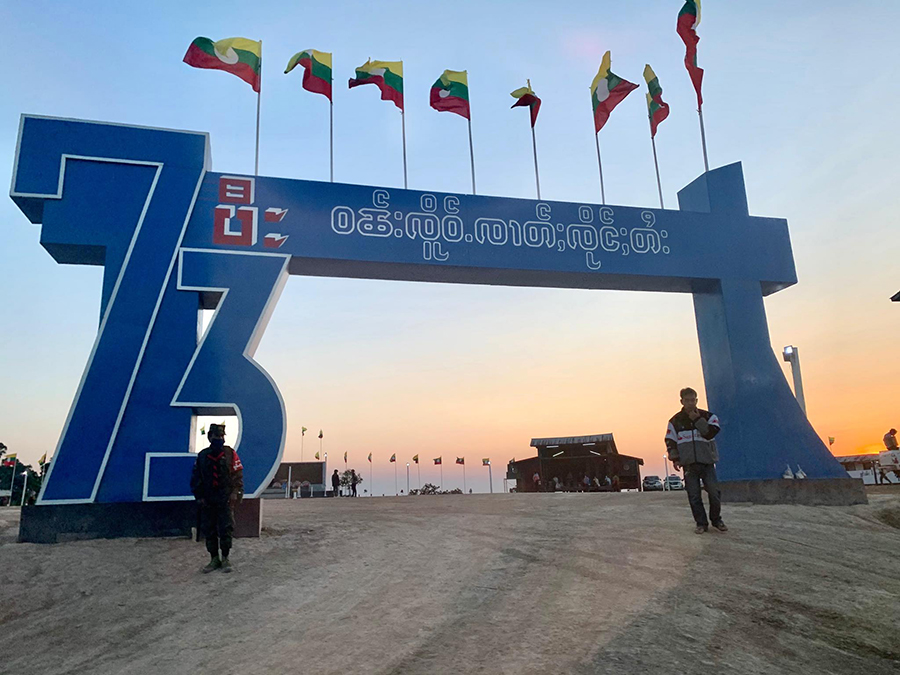
Dr. Tin Myo Win, vice chairman of the NRPC, seems unfamiliar with peace and conflict issues, and ethnic politics in Myanmar. Many ethnic leaders were extremely disappointed by his appointment.
Little wonder, then, that they yearn for the old days of peace talks, fun and whiskey—in fact to hear them talk, it seems that peace and whiskey are inseparable.
The night we gathered at Loi Tai Leng we observed there were enough Thai brand beers and whiskey, not to mention moonshine—including one produced by Gen. Yawd Serk himself—and almost everyone got drunk.
Raising their glasses, some ethnic leaders said they didn’t want to hear any more talk about the Myanmar military’s “six-point peace principles”, which were drafted when a military junta ruled Myanmar and require ethnic militias to accept the 2008 Constitution and disarm. “Once they start to talk about the six points, we feel it’s going nowhere,” they said. The plain fact is that the majority of ethnic armed groups do not accept the 2008 Constitution.
A representative of the Kachin Independence Army chimed in, saying, “If they keep talking about the DDR, we can’t move forward,” referring to DDR-SSR, or disarmament, demobilization and reintegration, and security sector reform.
After sipping his drink, he added, “The more we have political space, the less we will have armed conflict.” But what’s happening now is the exact opposite, he said.

“If you want to end armed conflict, create and expand more political space,” he said. “Otherwise, we’re doomed.”
As night fell and a chill wind blew onto the stage, the whiskey continued to arrive.
Speaking bluntly to a visiting Tatmadaw general (they’re all generals, after all), Karenni army chief General Bee Htoo said, “Before you ask us to sign [the ceasefire], look at what happened to those who have signed the NCA,” suggesting that the pact is in disarray.
The officer he was addressing, Lieutenant General Aye Win, kept his cool, the smile never leaving his face. (Perhaps this even temperament is the reason he was sent to the SSA-S headquarters. Karenni commanders are often a source of amusement at such functions, known for having little time for protocol and diplomacy.) At one previous gathering, a Karenni commander boasted to a Myanmar general about how he and his rebel soldiers had blown up a major power cable connecting central Myanmar and Kayah State. The outburst prompted both laughter and discomfort. Well, this is the nature of peace talks – especially in Myanmar, whose long-running civil war has killed and maimed so many over the years.
The Karenni army, which is controlled by the Karenni National Progressive Party (KNPP), is not currently engaged in serious military clashes with the Myanmar army, nor are the two sides seriously at odds ideologically, but they haven’t been able to sign a ceasefire. Many Karenni leaders have lived over the border in Thailand’s Mae Hong Song province for decades and are out of touch with reality.
Karenni civilian leaders from the KNPP didn’t show up for the Shan State National Day commemoration, offering the lame excuse that Loi Tai Leng is too cold.
In truth, they stayed away over what they perceive as a lack of respect from Myanmar army leaders whenever they meet for peace talks.
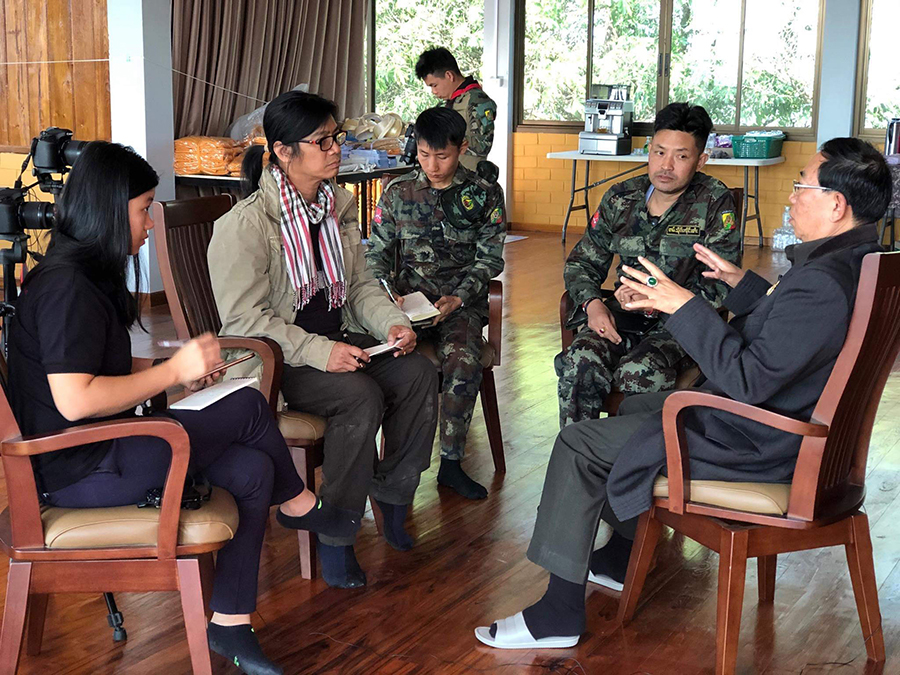
“They disregard our names, designations and positions,” a member of the KNPP leadership told us. “There should be mutual respect.”
This perception of the Myanmar generals who take part in peace talks as patronizing and disrespectful was echoed by several ethnic leaders. “If I am a general, they should properly address me by my title and my name,” a Shan commander said. “It’s better to show respect and [embrace] dialogue.”
As the night wore on, the temperature on the hill began to drop sharply. And while the Shan soldiers guarding the gathering and the 73rd annual Shan State National Day kept the festivities safe and sound, it was impossible not to sense the deep and lingering mistrust on this cold winter night, and for all the laughter, a sense of caution lay underneath all discussions of the peace process.
The next day, still nursing hangovers from the late-night drinking session, all those present dressed up and attended the ceremony, which began at 6 a.m.
Gen. Yawd Serk’s speech was nothing if not cautious and cordial. He spoke about “those engaging in dialogue who are afraid of losing the powers they presently hold” and having “little trust”, but called for “patience in building trust and engaging in political dialogue.”
The same note was struck in the messages from President U Win Myint and Snr-Gen Min Aung Hlaing, respectively, which were read out by government and military representatives. The words “federal union” were repeated numerous times to an audience of thousands of Shan villagers, though many of them probably did not understand the Burmese-language speeches. But they seemed curious at the sight of the Shan leaders and other luminaries seated on the stage. Doubtless many were hoping that the evening would bring more traditional Shan dances and fireworks.
There was no mention of the six-point peace policy, or of surrender or disarming, but Snr-Gen Min Aung Hlaing urged the rebel groups to put aside their arms and make peace.
Some participants yawned during the ceremony; some busied themselves taking photos, while others tried to warm themselves by moving into the sunlight.
Interestingly, the Shan soldiers did not show off their arms and heavy weapons at this year’s parade, limiting their displays to demonstrations of marching discipline and martial arts. Observers concluded this restraint was out of respect for their distinguished guests from Naypyitaw.
Some observers said the military’s decision to send a high-ranking general to Loi Tai Leng was significant, demonstrating a genuine interest in Shan politics and a desire for Gen. Yawd Serk to take a leading role in the faltering peace process.
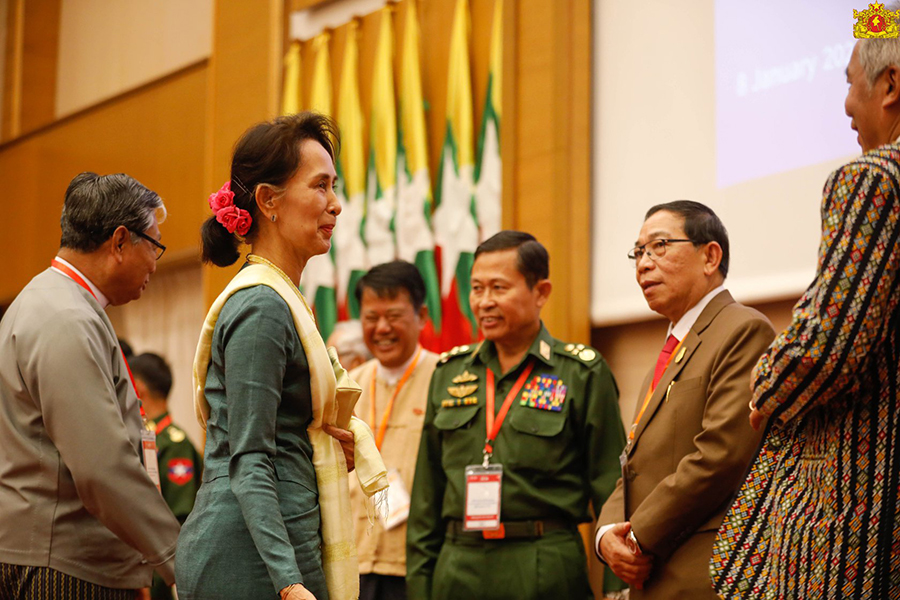
This could signal that the Shan are set to assume a leading role in the process, taking over from Karen insurgents who have been a significant force in the peace process for the past eight years.
The army’s relations with the Karen have been sensitive and fragile of late, with a sense that serious fighting could erupt at any time.
Tensions between Karen and Myanmar forces have been rising since last year, and a recent spate of clashes in areas controlled by the Karen National Union (KNU)/Karen National Liberation Army (KNLA)’s Brigade 5 have demonstrated the fragility of the NCA.
A senior Myanmar general confirmed to me a few weeks ago that serious fighting could break out at any time in the area.
“We asked them [the KNU], ‘Do you want us to attack’? If so, please define the area,’” said the general. The military wanted to limit its fighting to the 5th Brigade area. It is believed that the top Karen leaders have little control over the area.
Karen leaders are split into two factions. Saw Mutu Say Poe, now in his late 80s, is a military and political leader and remains chairman of the KNU. His faction is pro-ceasefire and still enjoys a good relationship with the government and the military. The other faction is allied with a group of hardcore Karen army commanders who want to resume fighting. Myanmar military leaders observing this internal conflict have been dismayed to see Saw Mutu Say Poe’s faction lose power to the point where it is in danger of being dethroned.
A powerful leader within the KNLA’s 5th Brigade area is General Baw Kyah Heh, who is known to be a hardliner and a good commander. The trouble started when the Myanmar army began building a road in the 5th Brigade area, sparking fierce opposition among local Karen, who say the road will bring not peace but food and weapons for Myanmar troops stationed in the area. They have demanded the project be stopped, but the Tatmadaw has refused.
There have been regular skirmishes between the two sides, but the situation deteriorated dramatically after the killing of a Myanmar officer in a landmine explosion in late January in an area where the 5th Brigade is active.
Karen leaders also object to the military’s use of drones in the area. The NCA forbids military deployments, surveillance activities, reinforcements, armed fighting, the use of landmines, other forms of violence, and damage to physical properties in all ceasefire territories. Neither the military nor the ethnic armies adhere to the provisions of the agreement, however. Since the ceasefire was signed, the two sides have continued to expand their territory, deploy troops and engage in aggressive recruitment in ethnic villages.
Myanmar army leaders also suspect that Karen leaders in the 5th Brigade area have established regular ties with the powerful Wa armed force known as the United Wa State Army, which sells and supplies weapons to ethnic armed groups in the country. This connection with the Wa in the north has set alarm bells ringing among Myanmar’s generals.
Furthermore, gold mining is a lucrative business in the 5thBrigade area and there is no shortage of cash to buy more arms. The tough Karen commanders won’t mind the thought of resuming the conflict.
Sensing the threat of renewed conflict, the Myanmar army leaders may feel a need to reassess their relationship with the Karen as the KNU sorts out its internal conflict. And if the Karen commanders want to fight, the Myanmar army is still capable of fighting despite the deployment of several light infantry divisions in conflict-torn northern Rakhine State on Myanmar’s western border. “We haven’t gone out to fight yet,” a top general told me recently, “but our soldiers are itching to go out and attack since we lost our officer [in the mine blast].”
Thus, making peace with the Shan makes sense for the foreseeable future.

Even Chinese officials, who promised to broker a peace deal between the central government and the ethnic rebels, are paying attention to Gen. Yawd Serk lately. So they visit him often. Perhaps, some observers say, the Chinese want to convince him they are not just siding with the Northern Alliance of ethnic armed groups, but are willing to engage with the SSA-South as well.
A Chinese gas pipeline passes through Shan State, and upcoming BRI projects including roads, bridges and construction projects will go through the area.
On the Chinese projects, Gen. Yawd Serk said that consultations with local groups who oppose the projects are needed. “For instance, the gas pipelines from Rakhine State pass through Shan State and the Shan State government is supposed to get 5 percent as compensation. But we don’t know anything about it: who accepted the compensation, who signed and how much are local residents compensated?” he said.
He added, “Our people have lost many things due to the pipelines but they do not have any rights. When we ask [those who build the pipelines], they know nothing.”
Sun Guoxiang, a special envoy from Beijing, has also met Gen. Yawd Serk. Last year, the Chinese asked the general to help convince the non-NCA signatories in northern Myanmar and the Karenni National Progressive Party to sign the agreement. So perhaps China and Myanmar these days see him as a key figure to help move the fragile peace process forward.
Nonetheless, some Shan commanders who showed up with big smiles at the ceremony in Loi Tai Leng still quietly express concern that fighting could break out in 2021, as both sides are having difficulty controlling their troops on the ground. This view is in sharp contrast to Gen. Yawd Serk’s upbeat mood. “We are worried,” a Shan commander told me; it seems that for all the handshakes and smiles, the situation on the ground is not so promising.
The Shan villagers at Loi Tai Leng happily braved the cold to attend the Shan State National Day celebration; many traveled from central or northern Shan State to be there.
A woman in her early 60s talked about recruitment in her village, adding that her son had migrated to northern Thailand to look for work. But she said she was OK. “Whoever comes to our village, we cook for them and feed them.”
Sai Mong, a villager in his late 30s wearing a traditional Shan outfit, spoke of insecurity and skirmishes in the area where he lives, near Lashio. “There are soldiers and rebels and militia,” he said with laugh. Who is the troublemaker? He shakes his head, “I don’t know; I read the news and they say there will be peace, but we are afraid.”
They don’t know who is doing the shelling; they just pay their taxes and provide food for whoever comes to the village. “But there is no peace and we haven’t held a traditional festival for more than a year,” he said. Then he added, “But I’m happy to be here.”
You may also like these stories:
‘We Have Never Talked About Secession’: RCSS Chief


